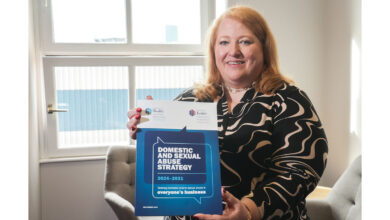Enabling access to justice

Following her announcement of a planned major reform programme for the justice system, Minister for Justice Naomi Long MLA talks to David Whelan about her proposals, her return to the portfolio, and her wider legislative priorities.
Recognised as one of the most proactive ministers in driving legislative change during the shortened 2017 to 2022 mandate, the return of Long to the Justice portfolio in February 2024, after a two-year Executive and Assembly absence, appeared a logical outcome.
While delighted to be picking up on “unfinished business”, Long is adamant that her return was not a foregone conclusion, firstly, because her party had to weigh up whether to take up a place in the Executive, and secondly, as the party decided on their portfolio preference.
Explaining the decision-making that has led her back to the portfolio, she says: “I felt that in the last mandate we achieved a lot in government that we would not have been capable of in opposition, and I believe that influenced the party in our decision to return to the Executive.
“In relation to justice, I had left the last mandate feeling like there was unfinished business. I had done a lot of preparatory work on bills, looking towards the new mandate and there were areas that, with two-and-a-half-years of additional experience, I could see that reform was not just possible, but necessary.”
Long admits to a frustration that she will not have a full five-year term to drive necessary change, which would have been afforded had the Executive reformed after the 2022 Assembly election. Having originally strategically planned for five major pieces of legislation to be passed and enacted across the mandate, the Minister says that she has had to “rejig” her plans, and now expects to publish three significant pieces of legislation across the remainder of her three-year term.
Highlighting the shortened nature of both the 2017 to 2022 mandate, and the current mandate to 2027, the Minister describes the transition as being akin to “a comma, rather than a full stop”, but insists that much has changed in the absence of the Executive.
“Undoubtedly the landscape to which I was returning had changed. In the previous mandate, I had suggested that funding levels for the Department meant that we were teetering on the brink of a crisis. By the time I returned, we were in crisis,” she states, pointing to falling police numbers and a rising prison population as examples of extraordinary pressures that had been compounded during the Executive and Assembly’s absence.
On the other side, Long has also been able to witness first-hand the positive impacts of her legislative changes made in the previous mandate.
In January 2025, Long welcomed the first official publication of domestic abuse prosecutions and convictions statistics following the introduction of the Domestic Abuse and Civil Proceedings Act (Northern Ireland) 2021, which created a new domestic abuse offence and criminalised a course of abusive behaviour.
“The number of people reporting is evidence that this legislation is working. Remember that these are people who were already being subjected to an offence, they are not new crimes,” Long says, responding to a question as to whether these new laws had increased the pressure on under-resourced policing and court systems.
“By codifying an offence as being against the law, we are not creating these offences. What we are doing is holding those responsible to account, and sending a message to future generations that these are not acceptable behaviours.
“It is important, from my perspective, that I give the legal system every opportunity to hold those offenders to account and to address those behaviours when they happen, but also, that we start as a solid conversation about acceptable behaviour in relationships, about what domestic violence and abuse can look like, and about what coercive control is and how it feels. Our aim is to prevent that behaviour, to prevent people becoming victims, and ultimately, there will be a saving to that preventative action across the whole public service system.”
Pointing to the publication in September 2024 of the Domestic and Sexual Abuse Strategy, a seven-year strategy with an associated three-year action plan, closely aligned with the Executive’s Ending Violence Against Women and Girls Strategy, as evidence of ongoing efforts to prevent offences, she adds: “I understand that some people will view the creation of a new law as meaning more work for the PSNI, and yes, it is true that there are new offences that must be considered when approaching a domestic situation, however, our aim is to equip those officers with the means of early intervention.”
Outlining that she will continue to push for greater levels of resourcing for her department, Long says that she has held constructive conversations with Finance Minister Caoimhe Archibald MLA, highlighting the impact of historical underfunding, and future priorities. “We are in a better position today than we were when I came into office,” she states. “We have been able to demonstrate that the limited funding available to us is being spent in the right places to protect people and towards our plans to transform and speed up the justice system.”
Justice reset
A critical part of that envisaged transformation was outlined by Long in December 2024, in what is described as “a major programme of reform to improve access to justice and better support those using publicly funded legal services”.
Long’s plans, however, have already experienced some turbulence. An announcement of the programme on 2 December 2024 pledged the publication of a Programme Delivery Plan “next week”. By late January, that plan had yet to emerge.
Asked about the delay, Long explains that while the plan was shared with the Assembly’s Justice Committee within the week, as intended, consultation of the document was delayed after notification was received that criminal barristers in Northern Ireland were to stage a withdrawal from legally-aided Crown Court cases between 6 and 31 January 2025, in a protest over legal aid fees and payment schedules.
“The priority had to be engagement to try to end that strike,” says Long, who describes the strike action as “unnecessary” given her public commitment to an uplift of 16 per cent to legal aid fees across criminal, civil, family and immigration law.
“I have always been clear that I believe in the legal aid system. I believe that we need to maximise access for those most vulnerable to the justice system and that we to make sure that finance is not a barrier to that.”
“We have been able to demonstrate that the limited funding available to us is being spent in the right places to protect people and towards our plans to transform and speed up the justice system.”
Reform
Although Long believes the Criminal Bar’s strike action was premature in the face of the Department outlining their intentions, clearly the strike action has had an impact on the future shape of the delivery plan.
“There are areas raised that we now want to look at – not in terms of content, but specifically at prioritisation within the plan,” Long says, pointing to a need to find a balance between the sector’s concerns and the ambitions of her department.
“I am open to listening to the professions, but I also have to bear in mind that the professions are themselves a vested financial interest in the system. My interest is in public access to justice, and I have to approach these issues from that perspective, whilst listening to the professions who deliver the services.
“Where I can be of assistance, I will. For example, I have committed to the uplift of legal aid fees as a matter of urgency and have got agreement from the Assembly’s Justice Committee for a shortened eight week consultation. However, we must go through that process and there will need to be secondary legislation to enable that change, so it cannot happen immediately.
“I want to build that confidence back into the professions that I am serious about the uplift and I am serious about delivery of reform.”
Beyond the uplift of legal aid fees, Long explains that within the broader package of access to justice reforms are proposals around improving access to justice; ensuring appropriate quality services; ensuring value; managing public funds; and oversight. Each of these issues, and various programmes within them, ranging from enhancing access to legal advice and guidance, through to appropriately funding early resolution mechanisms and the underpinning of a sustainable profession, will be consulted on individually.

“We know that waiting for a long time increases the level of attrition, particularly for vulnerable witnesses, and so we are very keen to see justice sped up.”
Legislative progress
Returning to her legislative programme for the remainder of the mandate, Long says that she hopes the Justice Bill, introduced in September 2024, will have made speedy progress by the end of the year. A call for evidence is expected to be announced by the Assembly’s Justice Committee in February 2025, and Long says that her department will work with the committee to help ensure the Bill’s progress is expedited.
In addition, the Department is currently drafting a Sentencing Bill, which Long explains will cover a number of key priorities including clarity and guidance around sentencing, and in relation to aggravators and statutory aggravators. In particular, the bill will seek to provide clarity on sentencing for those who attack public workers, and no body murder cases, while also incorporating elements of a foundational hate crime bill, which will now not come forward due to time restraints. Expected to be introduced to the Assembly in Autumn 2025, the bill will also seek to increase the maximum sentence in cases of death by dangerous driving, where intoxication or drugs are involved.
“We are also currently consulting on a victim and witnesses bill with the intention of introducing that next year. The bill will seek to cover other parts of the intended hate crime bill and protect vulnerable witnesses through enabling special measures in court, or use of the remote evidence centre. The bill will also put the Victims of Crime Commissioner on a statutory footing, while underpinning in legislation some of the outstanding recommendations from the Gillen review of the law and procedures in serious sexual offences in Northern Ireland.”
Importantly, explains Long, legislation alone will not define the remainder of her term at the helm of the Department of Justice, with the Minister acknowledging that underpinning transformation ambitions is the need to “speed up justice”.
“We know that waiting for a long time increases the level of attrition, particularly for vulnerable witnesses, and so we are very keen to see justice sped up. Delay is also an injustice that affects those who are accused of crimes, because very many of them are remanded in custody while awaiting trial, resulting in overpopulation of our prisons.”
Highlighting a variety of programmes already being rolled out that do not require legislative change, Long concludes: “Many good initiatives are taking place in the justice sector which are maybe not spoken about widely, but which are building confidence in the system and laying the foundations for transformation.
“I think it is really important that the Department of Justice continues to work on those issues and continue to deliver real results.”
Post publication, on 30 January 2025, Justice Minister Naomi Long published The Enabling Access Programme Delivery Plan, which will be subject to an eight-week consultation.





